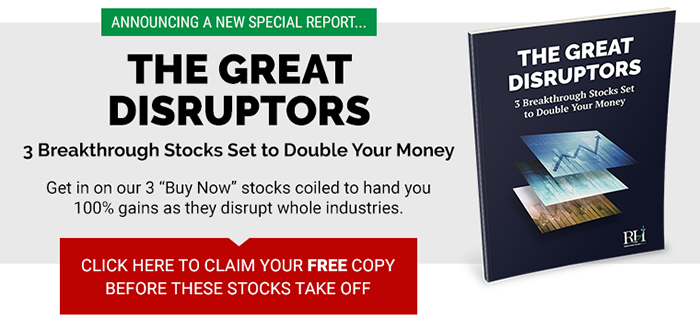Last summer on a Friday in late June, 33,000 Americans lost their jobs.
That was the day Toys “R” Us shut its doors for good.
The company had been selling toys since 1948…
It once ran a 110,000 square-foot store in NYC’s Times Square, one of the most valuable pieces of land in the country…
And for decades, kids screamed to go to Toys “R” Us on Christmases, birthdays, and weekends.
- Then the great white shark of retail came along…
Internet juggernaut Amazon (AMZN) essentially put Toys “R” Us out of business.
As you surely know, Amazon sells stuff online for cheap. Cheaper, usually, than what you’ll pay in a store.
Jeff Bezos founded Amazon 24 years ago. Since then it has contributed to putting Bon-Ton, Borders, Circuit City, RadioShack, and hundreds of other store chains out of business.
Many other retailers are barely clinging to life. Macy’s (M), JCPenney (JCP), and GameStop (GME) still have a pulse, but they’re fading fast. Since 2014 their stocks have plunged 53%, 77%, and 68%.
According to leading research firm Nielsen, store closings in the US hit an all-time high last year.
With all this destruction, many investors assume there are only two types of retailers:
Those that Amazon has already put out of business…
And those that Amazon will soon put out of business.
- What I’m about to say will surprise those folks…
There’s a third type of retailer that Amazon can never disrupt.
One innovative company has figured out how to tap into these Amazon-proof businesses.
It has rewarded stockholders with twice the gains of Amazon in the past year…
It pays a big and growing dividend…
And super-investor Warren Buffet quietly bought 10% of the company in 2017.
- STORE Capital (STOR) forms partnerships with businesses that are immune to Amazon’s disruption.
I’m talking about businesses like daycare centers, vet clinics, hair salons, dental practices, gyms, and restaurants.
In other words, businesses that you must visit in person.
Want a new TV? Order one on Amazon and it’ll be on your porch tomorrow.
But if you need a cavity fixed, or your dog groomed, or a babysitter to watch your kid, Amazon can’t help you.
You wouldn’t know it from watching the news, but these small- and medium-sized businesses are thriving while many others struggle to keep the doors open.
- STORE is a unique real estate play…
It is a Real Estate Investment Trust (REIT). REITs earn rental income from properties they own. Then they hand most of the profits to investors in the form of dividends.
STORE is unlike any REIT out there. Most REITs specialize in a certain type of real estate. For example, a residential REIT might own condos or apartment buildings.
STORE handpicks businesses that are shielded from the disruptive force of online retail. In short, it buys land and buildings from these “undisputable” businesses, then leases it back to them.
The arrangement is a win-win. Many smaller shops have a lot of money tied up in real estate. STORE helps them turn that value into cash they can invest in their growing businesses.
- STORE is worth around $7 billion and is going after a $3 trillion market.
As regular RiskHedge readers know, we often look to invest in smaller firms going after large markets. These are the kinds of stocks that could double or triple quickly and still have lots of room to grow.
STORE is going after a HUGE market. Mid-sized businesses employ one in every four American workers. STORE could triple its market share and it would still own less than 1% of its target market in the US.
STORE owns properties used by 421 tenants operating in 103 different industries in 49 US states. 75% of its tenants collect over $50 million in revenue a year.
According to company filings, the businesses it works with are growing profits at roughly 15% a year.
- Super-investor Warren Buffett holds a big chunk of STORE… and it’s the only real estate stock he owns.
As I mentioned, Warren Buffett owns 10% of the company.
Buffett has built his $85 billion fortune by owning great businesses for the long haul.
For example he first bought $1 billion worth of Coca-Cola (KO) shares over 30 years ago and says he’d “never sell a share.”
Buffett’s big stake in STOR tells you all you need to know about how strong its business model is.
- Last quarter, STOR reported record earnings of $137 million, good for a 69% jump from a year earlier.
It pays a 4.1% dividend—more than double the S&P 500 average.
And over the past five years STORE has raised its dividend 32%.
As it continues to partner with “undisputable” businesses, I see its dividend growing in the neighborhood of 7–8% per year.
Today, for every STORE share you own you’ll get a $1.32 cash payment each year. If it continues to hike its dividend as I expect, you’ll get an automatic raise each year.
That’s it for this week. Are you buying STORE? Tell me at stephen@riskhedge.com.
Stephen McBride
Chief Analyst, RiskHedge
Reader Mailbag
RiskHedge reader Arianne has a question about which stocks to buy right now.
Hi Stephen.
I don't have a lot of money, I'm living on a high school teacher's salary–so I'd like to invest wisely. I don't have thousands of dollars to throw around.
Where would you recommend investing right now?
Thank you, Arianne
Arianne, thanks for your question.
I can’t give individual investing advice, but I’ll give you two pointers that should help you invest wisely.
First, you should limit your investment in any one stock to a maximum of 5% of your portfolio. So, if you have $2,000 to invest, don’t buy more than $100 of any one stock.
This ensures your portfolio won’t get crippled if something goes wrong with one stock.
Second, think about investing in ETFs. As you may know, ETFs hold a basket of stocks. Owning an ETF is a cost-effective way to “spread your bets” so you don’t have too much of your portfolio riding on any one stock.
For example, if you like cybersecurity stocks, take a look at the Prime Cyber Security (HACK) ETF.




